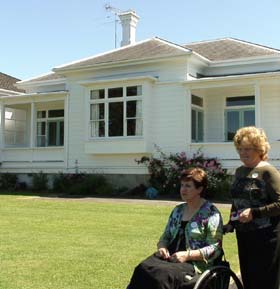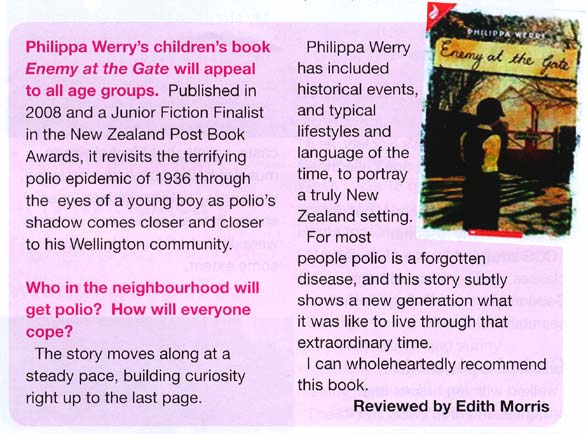
previous page

23 support groups throughout the country.
We share a common bond of being part of a unique time in history that has all but been forgotten in the nation’s psyche.
Edith is President of New Zealand’s Post Polio Support Society, (0800) 476 546.
Above, Edith and her sister visit Auckland’s Wilson Home, where Edith spent several years recovering from polio.
Previous pages, Edith with medical staff at the Wilson Home, and other young polio survivors.
our years of activity: school, sport, jobs, marriage, children.
Polio seemed to be behind us.
We didn’t talk about our early struggles and we certainly didn’t ask for help. Why should we?
We can cope, we can do it ourselves. Self-reliant, stubborn, and driven are some of the words used by many polio survivors.
I often say “we are not victims of polio. We are survivors.”
Once, a friends said, “It sounds like you’ve survived a war when you use that word.”
That’s it exactly!
What is it?
We have soldiered on regardless of exhaustion, weakness and pain.
We have dragged around our polio bodies on sticks to prop us up and braces to hold our legs, backs and necks upright.
By shear determination and drive we have pushed ourselves to the limit.
But something’s gotta give.
Around the mid 1980’s people with polio began to complain to their doctors and therapists that they were having strange new symptoms.
They said “we are so tired, we can’t cope, we are falling over, we are in pain and we don’t know what to do about it.”
The usual answers were “you are just being lazy, do more exercise, you are getting old, its all in your head, so just buck yourself up”.
New Diagnosis
Polio survivors all around the world were experiencing similar problems. Already weakened muscles that had been overused for decades finally rebelled.
These collective symptoms define Post Polio Syndrome, or The Late Effects of Polio.
In the initial epidemics is was roughly estimated that there were 10,000 people who had polio in New Zealand. As the decades have gone by it is unknown how many of these are still alive, and might now affected by Post Polio Syndrome.
Support Society
We do know that those who are members of the Post Polio Support Society of New Zealand are only the tip of the iceberg.
Hundreds more who are living with pain, weakness and fatigue could be helped if our society can locate them. We assist with information for their doctors, education about Post Polio Syndrome, and offers of encouragement from one of our

To download this article in PDF form, click here
For more information about the Post Polio Support Society, www.postpolio.org.nz